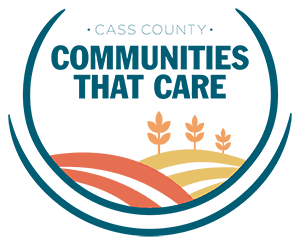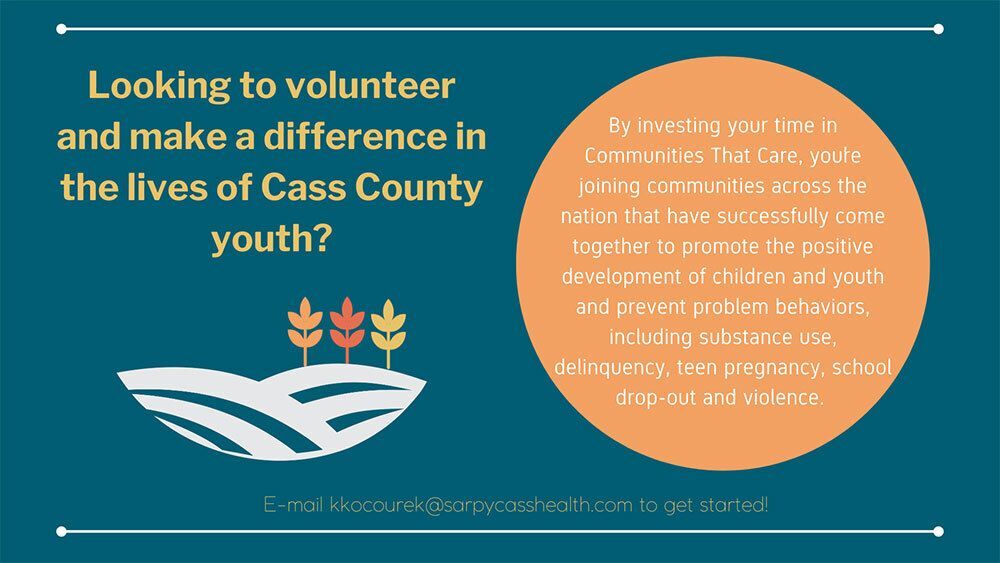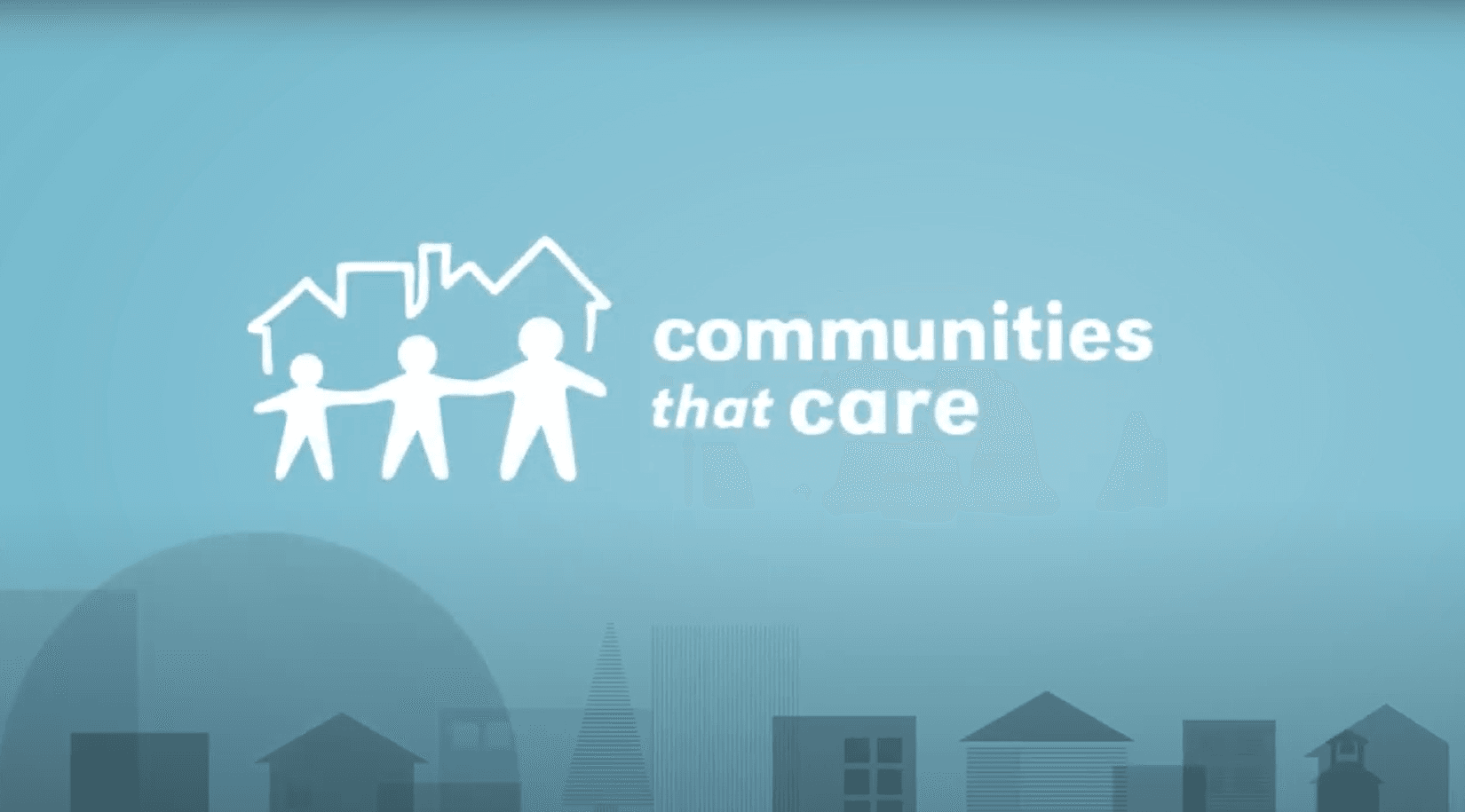Cass County Communities that Care

What is CTC?
Cass County Communities that Care (CTC) is a group of community members committed to improving the lives of children and youth in the county. CTC guides communities through a proven five-phase change process. Using prevention science as its base, CTC promotes healthy youth development, improves youth outcomes, and reduces problem behaviors.
Video: An Introduction to Communities That Care
How Do I Get Involved?

The Science Behind CTC
The Social Development Strategy fosters the success and health of young people from before birth through every stage of development. It’s easy to use, easy to remember, and it works! Providing young people with opportunities, skills and recognition strengthens bonding with family, school and community. Strong bonds motivate young people to adopt healthy standards for behavior. This strategy has been tested and proven effective.
Positive youth outcomes include: a greater percentage of students who graduated high school on time, better economic outcomes, better mental health in their 20’s, significantly fewer sexually transmitted diseases—especially among those at greatest risk, and fewer teen pregnancies.
Current CTC Work in Cass County
-
Youth Survey
In December 2021, all 5 public school districts participated in the CTC Youth Survey. This survey was designed to assess students’ involvement in a specific set of problem behaviors, as well as their exposure to a set of scientifically validated risk and protective factors. The risk and protective factors have been shown to influence the likelihood of academic success, school dropout, substance abuse, violence, and delinquency among youth.
The risk and Protective Factor Model of Prevention is a proven way of reducing substance abuse and its related consequences. This model is based on the simple premise that to prevent a problem from happening, we need to identify factors that increase the risk of that problem developing and then find ways to reduce the risk.
-
School-Based Program
A school-based social emotional learning program for students in elementary and middle schools to increase positive behavior, reduce negative behavior, and improve social and emotional learning and school climate. It includes a detailed curriculum with lessons 2-4 times a week-approximately 140 15-minute lessons per grade K-6, and 82 15-20 minute lessons per grade 7 and 8. The content of the classroom curriculum is taught through six units, which teach the following:
- The Positive Action Philosophy and the Thoughts-Actions-Feelings about Self Circle This unit provides the conceptual foundation for the content of the program delivered in Units 2-6 and teaches generally about positive and negative actions and their meaning for and application to life. The remaining units teach the specific positive actions for the whole self: the physical, intellectual, social and emotional.
- Positive Actions for Body and Mind - This unit focuses on nutrition, exercise, sleep, hygiene and other good health habits for the physical area, and thinking skills, problem solving, decision making, memorizing, reasoning, thinking creatively, curiosity study skills and the value of learning for the intellectual area.
- Social/Emotional Positive Actions for Managing Yourself Responsibly - Students are taught to manage their personal resources like time, energy, thoughts, actions, feelings, money, talents and possessions, including basic self-control or self-regulation skills.
- Social/Emotional Positive Actions for Getting Along with Others - Students are taught to get along with others by treating them the way they would like to be treated, so they learn about respect, empathy, kindness, fairness, and cooperation and other ways they like to be treated.
- Social/Emotional Positive Actions for Being Honest with Yourself and Others - Students are taught to be honest with themselves and others by responsibility taking, learning how to be truthful, admitting to mistakes, not blaming others, knowing their own strengths and weaknesses, and following through with commitments.
- Social/Emotional Positive Actions for Improving Yourself Continuously - Students are taught how to set and achieve goals for all areas of themselves and learn how to reach goals by having the courage to try, turning problems into opportunities, believing in their potential, persisting and keeping an open mind in order to broaden their horizons.
-
Community-Based Program
Guiding Good Choices
Guiding Good Choices gives families information and tools that work to protect preteens and teens from the inevitable risks they encounter as they become more independent. Just as important, families will learn ways to build or maintain lasting relationships, because teenagers who are more closely connected to their families have better health and educational outcomes. At the end of each session, participants learn how to hold a family meeting to share lessons learned or plan some fun family time. This regular time together builds bonds, promotes health, and helps GGC skills become a part of family life.
INTRODUCTORY SESSION
Building a Learning Community
Parents will learn about fostering community while participating in GGC virtually.SESSION 1
Getting Started: How to Promote Health and Wellbeing During the Teen Years
Parents learn about the nature and extent of problem behaviors among teens and decide for themselves how they want to prevent problems in their own families.SESSION 2
Setting Guidelines: How to Develop Health Beliefs and Clear Standards
Parents develop clear family guidelines and expectations for behavior.SESSION 3
Managing Conflict: How to Deal with Your Anger in a Positive Way
Parents learn to manage family conflict in a way that maintains and strengthens bonds with their children.SESSION 4
Avoiding Trouble: How to Say No, Keep Your Friends, and Still Have Fun
Children and parents are invited to this session. They learn skills children can use for staying out of trouble and keeping their friends, while still having fun.SESSION 5
Involving Everyone: How to Strengthen Family Bonds
Parents learn ways to strengthen family bonds and increase children’s involvement in their family through the teen years. Parents also learn how to create a parent support network.


